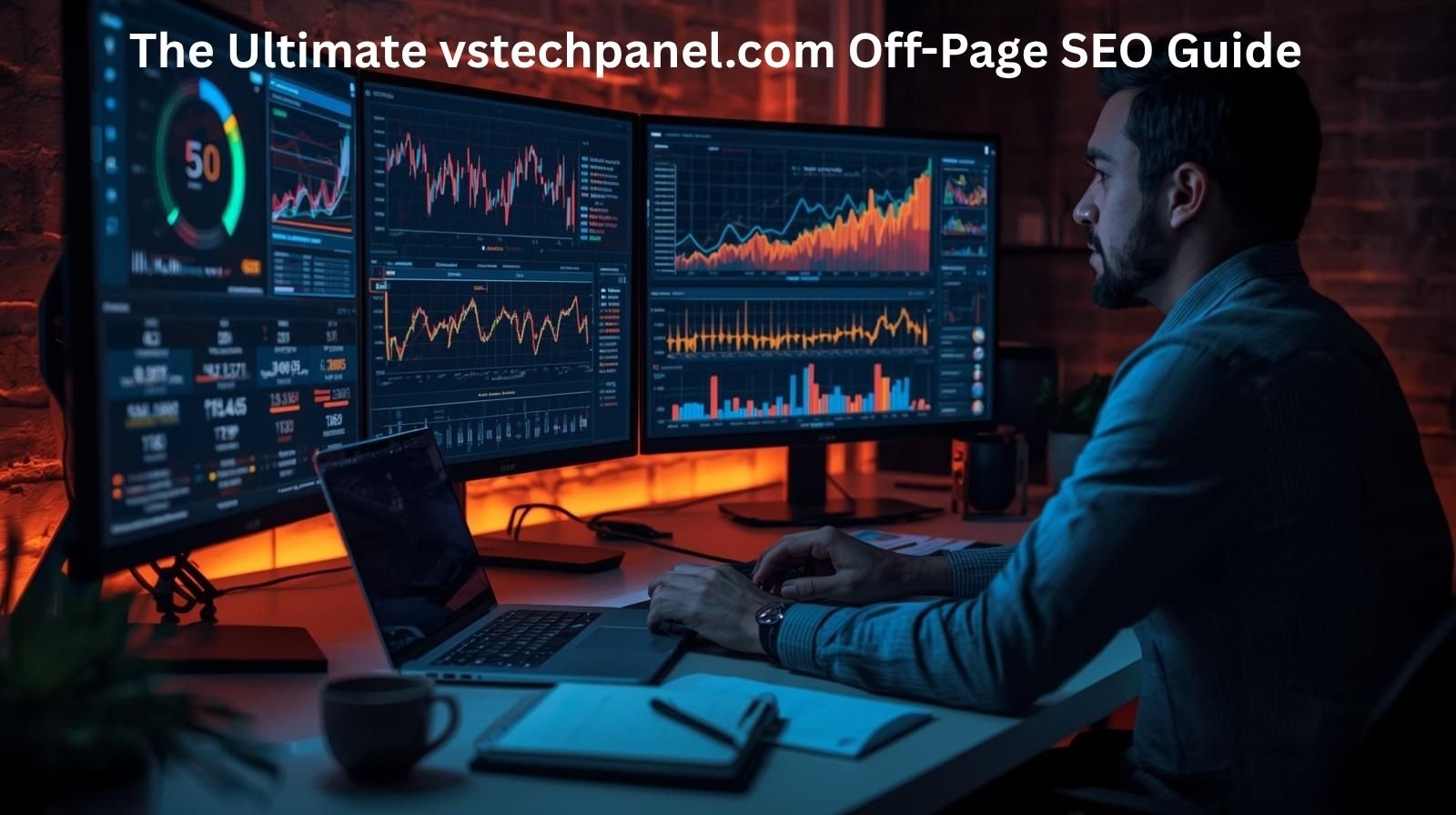Introduction
You know when you launch a new website or blog and think, “Alright, I’ve built it, so people will start coming soon”? Yeah… I’ve been there too. When I first started with vstechpanel.com, I believed great content would automatically attract visitors. Spoiler alert — it didn’t. What I learned pretty quickly was that content alone isn’t enough. You need to build reputation, credibility, and trust outside your website as well.
That’s where off-page SEO comes in — the art and science of getting your name out there. This guide isn’t going to throw buzzwords or robotic checklists at you. Instead, I’ll share how off-page SEO really works, what makes it effective, and how you can actually make it part of your growth strategy. Think of it as your friendly roadmap to making your website a respected name online, not just another link on Google’s 10th page.
What Is Off-Page SEO (and Why It Matters)
Off-page SEO simply means everything you do beyond your own website to build authority, recognition, and trust. It’s all about your online reputation — what others say about you, where your name appears, and how often people mention or link to your work.
Let’s be real for a second. You could have the best-looking site and the most brilliant content, but if nobody knows you exist, it won’t matter much. Off-page SEO acts like your word-of-mouth marketing in the digital world. When others reference you, link to you, or talk about you in their communities, Google (and your audience) start to see you as a reliable source.
That’s why this stuff matters. It helps you earn credibility instead of just claiming it.
The Core Elements of Off-Page SEO
Let’s look at the main building blocks of off-page SEO — the things that make a real difference in how the internet perceives your brand.
Backlinks – The Cornerstone
Backlinks are like votes of confidence from other sites. When someone links to your content, they’re basically saying, “Hey, this page is worth your time.”
But here’s the catch — not all votes are equal. A single link from a trusted, relevant website can do far more good than a hundred random ones. Quality always beats quantity.
If your site focuses on technology and marketing like vstechpanel.com, getting a backlink from a respected tech publication or a digital marketing blog will hold much more weight than links from unrelated directories.
Also, let’s not forget — the best backlinks are the ones you earn, not the ones you buy. Guest posts, collaborations, and genuinely useful content attract natural links that last.
Brand Mentions and References
Even when people mention your brand without linking to it, it still builds recognition and trust. Imagine a friend talking about a restaurant they love — even if they don’t hand you the menu, you’ll probably remember the name.
The same thing happens online. Every time someone talks about your brand, product, or content, it’s a small nudge to both the audience and search engines that you’re worth noticing.
So, pay attention to those mentions. Engage with people who talk about you. When appropriate, you can politely ask them to include a link — but even if they don’t, the visibility still counts.
Content Promotion and Outreach
The truth is, even the most amazing article won’t go anywhere if it just sits quietly on your site. You have to promote it.
Guest posting on relevant websites, collaborating with influencers, or simply sharing your content with online communities helps spread the word. You’re not just promoting a single post — you’re building relationships and credibility.
Here’s a small story: I once shared a long-form tech tutorial on social media and tagged a few creators in that space. One of them reshared it to their audience, which brought hundreds of new readers and even a couple of new backlinks. Moral of the story? Don’t underestimate the power of genuine outreach.
Social Engagement and Community Presence
Social signals may not directly boost your rankings, but they’re incredibly powerful in creating awareness. Every like, share, and comment adds visibility to your work.
Being active in online communities like Reddit, Quora, or niche forums isn’t just about self-promotion — it’s about becoming part of a conversation. When people start recognizing your name and associating it with helpful input, they’re more likely to visit your site or link to it later on.
Think of it as planting seeds. Some might sprout quickly, while others will grow over time into long-term opportunities.
Reviews, Reputation, and Trust
Reputation management is a huge part of off-page SEO. Whether it’s a client review, a testimonial, or a shoutout in an online discussion — every mention shapes how people perceive your brand.
Encourage happy users or readers to share their experiences. Respond to comments, even negative ones, with grace and honesty. A healthy, transparent reputation online goes a long way in building credibility and loyalty.

How vstechpanel.com’s Approach Differs
Not every site needs to play by the same rules. What works for a global brand might not make sense for a smaller platform or blog. Let’s compare a bit:
| Approach | Big Brands | vstechpanel.com-Style Strategy |
|---|---|---|
| Guest Posting | Broad and high volume | Focused on niche-relevant websites |
| Backlink Building | High quantity | Fewer but higher quality |
| Brand Mentions | National exposure | Targeted community mentions |
| Social Media | Paid promotions | Organic engagement and consistency |
| Public Relations | Major press coverage | Niche interviews, local media, and collaborations |
For smaller or emerging sites, what matters most is relevance and authenticity. Each link or mention should make sense and feel natural — not forced.
A Simple Step-by-Step Off-Page SEO Plan
If you’re ready to roll up your sleeves, here’s a simple roadmap to follow:
- Audit Your Backlinks
Take a look at who’s already linking to you. Are they reputable? Are there any harmful or spammy links that might be doing more harm than good? - Create Link-Worthy Content
Focus on content that people naturally want to share — research reports, tutorials, visual guides, or unique opinions. - Reach Out and Collaborate
Guest post on relevant blogs, collaborate with peers, and share insights. These relationships often lead to strong backlinks. - Monitor Mentions
Use alert tools to track whenever someone mentions your site or brand. Reach out and thank them — and if possible, ask for a link. - Engage and Contribute
Be part of communities related to your field. Answer questions, help others, and stay visible. - Review and Refine
Check your progress regularly. See what’s working, what’s not, and double down on what brings results.
A Real-Life Example
A friend of mine runs a small online publication. They wrote a case study on the latest marketing trends and emailed it to a few bloggers in the same niche. Within a week, several of those bloggers linked back to it in their own articles.
The results? That single post jumped in visibility, got shared dozens of times, and brought new organic visitors every single day.
That’s the power of a genuine off-page SEO effort — real people sharing real value.
Also read: Jaa Lifestyle & EEHHAAA Login Guide
Staying Safe and Smart
As with anything online, there are shortcuts that look tempting but can hurt you long-term. Avoid link schemes, spammy directories, or buying backlinks. Search engines have become very smart at detecting unnatural patterns.
Keep your growth organic. Build relationships, not link farms. Use diverse link text, stay patient, and focus on steady, honest progress. It’s slower — but it’s real, and it lasts.
Also, make sure you’re building trust. Use your real name, showcase your experience, and be transparent about who you are. Readers connect with authenticity, and trust is the ultimate ranking factor.
Conclusion
At its core, off-page SEO isn’t about tricks or secret formulas. It’s about reputation — and reputation takes time, effort, and genuine value.
By consistently creating helpful content, connecting with others, and showing up authentically, your site can become a trusted name in its space. And once that happens, everything else — traffic, visibility, growth — naturally follows.
So don’t rush it. Build relationships, stay true to your niche, and let your name earn the respect it deserves. That’s the true essence of great off-page SEO.
FAQs
1. What’s the difference between on-page and off-page SEO?
On-page SEO deals with things you can control directly — content, titles, and website structure. Off-page SEO focuses on what happens outside your site — links, mentions, and reputation.
2. How many backlinks do I actually need?
There’s no magic number. A handful of good-quality backlinks from respected sites can be far more effective than hundreds of random ones.
3. Do social media links count?
Not directly, but they can help your visibility and bring in new visitors — which often leads to more links organically.
4. How long does it take to see results?
Usually, a few months. Think of it as building momentum. The more consistent you are, the stronger your online presence becomes over time.
Thanks for visit Techzip




